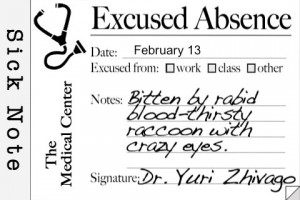Every year, CareerBuilder enlists the researchers at Harris Interactive to survey hiring managers and HR professionals about the excuses they hear when employees call in sick.
This is stuff you can’t possibly make up.
As CareerBuilder is careful to point out, “In the past year, 30 percent of workers have called in sick when not actually ill, keeping on par with previous years. Sick days, legitimate or otherwise, also become more frequent around the winter holidays, with nearly one-third of employers reporting more employees call in sick during the holiday season.”
Some 29% check up on the excuses
The survey also found that a fair number of managers want verification whether the sick worker is actually sick or not. This was a big issue for me when I was a manager in Hawaii, in a union shop, and mysteriously had a number of the surfers on my staff call in sick when the surf was particularly large. I never caught any of them actually surfing when they should have been home in bed, but that was more because I didn’t have the time or resources to play cop and track all of them down.
 CareerBuilder found that 29 percent of employers say they have checked up on an employee to verify that the illness is legitimate, usually by requiring a doctor’s note or calling the employee later in the day. In addition, another 18 percent of employers have had other employees call a suspected faker, and 14 percent have even gone so far as to drive by the employee’s home.
CareerBuilder found that 29 percent of employers say they have checked up on an employee to verify that the illness is legitimate, usually by requiring a doctor’s note or calling the employee later in the day. In addition, another 18 percent of employers have had other employees call a suspected faker, and 14 percent have even gone so far as to drive by the employee’s home.
All in all, some 17 percent of employers say they have actually fired employees for giving a fake excuse about being sick.
Some other facts from CareerBuilder before we get to the excuses:
- Some 31 percent of employers notice an uptick in sick days around the winter holidays;
- December is the most popular month to call in sick, with 20 percent saying their employees call in the most during that month.
- July is the next most popular month to skip out on work, followed by January and February.
- Next to actually being sick, the most common reasons employees call in sick are because they just don’t feel like going to work (34 percent), or because they felt like they needed to relax (29 percent). Others take the day off so they can make it to a doctor’s appointment (22 percent), catch up on sleep (16 percent), or run some errands (15 percent).
Craziest excuses when calling in sick
All of that is interesting information, but what you really want to know is what kinds of crazy excuses are employees making out there? Take a look at this list that CareerBuilder has compiled from the survey, because you may have heard some of these yourself
When asked to share the most memorable excuses, employers reported the following real-life examples:
- Employee’s sobriety tool wouldn’t allow the car to start.
- Employee forgot he had been hired for the job.
- Employee said her dog was having a nervous breakdown.
- Employee’s dead grandmother was being exhumed for a police investigation.
- Employee’s toe was stuck in a faucet.
- Employee said a bird bit her.
- Employee was upset after watching The Hunger Games.
- Employee got sick from reading too much.
- Employee was suffering from a broken heart.
- Employee’s hair turned orange from dying her hair at home.
Yes, these are pretty kooky excuses, but my guess is that TLNT readers have a lot more (and better) ones of their own. Heck, I bet that Tim Sackett alone has about a dozen good ones he could recite off the top of his head.
If you have a good (by good, I mean crazy) excuse that an employee has made for being sick, please leave it in the comments below. I’d love to get enough to do a TLNT version of this and see who really has the better excuses once and for all.
The survey was conducted online within the U.S. by Harris Interactive© on behalf of CareerBuilder among 2,494 U.S. hiring managers and human resource professionals and 3,976 U.S. workers (employed full-time, not self-employed, non-government) ages 18 and over between August 13 and September 6, 2012 (percentages for some questions are based on a subset, based on their responses to certain questions).
